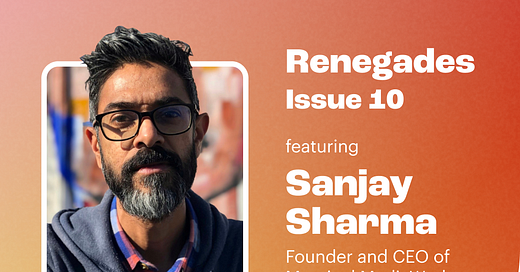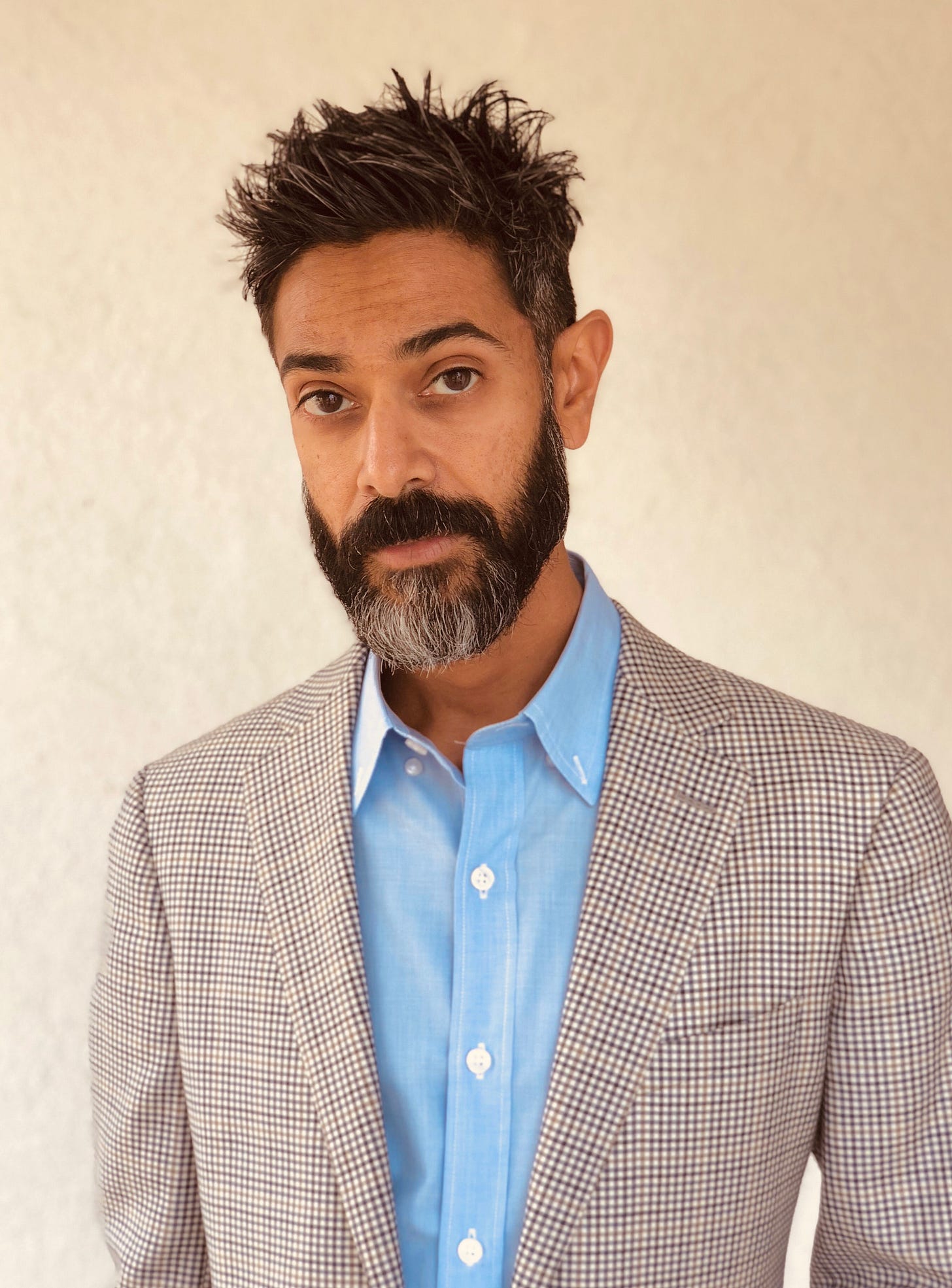Renegades, Issue 10: Sanjay Sharma (Marginal MediaWorks)
Building pathways for future Asian Pacific generations in media
Sanjay Sharma
Founder, CEO
Marginal MediaWorks
Welcome to Renegades, a series spotlighting Asian Pacific leaders and creatives who are carving their own paths and defying stereotypes along the way.
This week, we're featuring Sanjay Sharma, founder and CEO of Marginal MediaWorks, a media company focused on premium storytelling from singular subcultures and voices. Sanjay tells us about Steven Soderbergh’s influence on his career path, the importance of building a brand to connect with audiences, and visions for Asian Pacific representation in the entertainment and media landscape.
What did you want to be when you were growing up, and how does that compare to what you do today?
A filmmaker. Steven Soderbergh shot SEX, LIES, and VIDEOTAPE in my hometown, Baton Rouge, Louisiana, when I was in high school. Mind-blowing. I started writing and making short films, studied it in college, and really loved it...but as a first-generation Indian immigrant from Louisiana with a mountain of student loans and no network, it just wasn't in the cards. Also, I wasn't as talented or determined as M. Night [Shyamalan]. So, I had a more unusual path to government, law, and technology, yet ironically I've come full circle in some ways, building a company that empowers the next generation to pursue the kind of dream that I thought was impossible.
You studied film, history, and law. How did film become the prominent focus in your career trajectory?
Film has always been a first love for me, and it’s been a part of everything I’ve done in one way or another. While studying history, I always liked both a country’s history through film and the history of film in that country, and in law, I began one of the first “digital entertainment” practices, looking at how the internet was disrupting the music business and applying that understanding to how changes in technology, software, hardware, and distributed networking would apply to video and the business of filmed entertainment. This would end up being critical foundational work to everything from social video like YouTube to high-end streaming like Netflix.
It’s more recently become the basis of a company itself: we believe that changes in the business of filmed entertainment, as we move toward global streaming and away from a world centered on the US studio system, create a dynamic where diverse-led, controlled budget/indie film, series, animation, and audio can have tremendous cultural and commercial value in a way that Hollywood has long ignored. I wanted to be a writer/director as a kid, but there weren’t any Asian Americans doing it—zero network, mentors, or role models. Despite that, many of us got into these industries or through other paths (like law, for me). We now have a vehicle that centers marginalized creatives but allows them to use identity as a prism, not the plot of the stories they want to tell. This is a totally new approach where history itself and the history of film will prove to be quite rewarding.
You worked at Warner Bros. and tech start-ups before building up your own original media brands. What did you learn from the earlier part of your career that you brought to your work as an entrepreneur and brand-builder?
Media brands are hugely valuable and terribly hard to build! Brands that stand for something, that mean something to consumers are really special. Of course, at Warner Bros., we had some of the most iconic IPs in the world, and I had the honor of working on franchises like Ocean’s, Batman, The Matrix, and more. But the biggest brand in the family of companies was a premium cable subscription channel called HBO. As a long-time fan of the cable businesses that became mega-brands, from MTV and ESPN to CNN and BET, I spent a ton of time studying those businesses and specifically with the founders or early heads of MTV, BET, and HBO directly. It’s really about having a voice and creative filter that seems niche (or marginal) to a lot of folks, but that we know is actually massive. Machinima seemed like a niche—video gamers on Youtube—and became the largest media property on the entire platform. For MARGINAL, we get inspired by folks from Blumhouse to A24, Hillman Grad to Hoorae—companies building a new era of media brands that stand for something.
You’ve started three different media brands: Machinima, ALL DEF, and MARGINAL. As you look at Asian Pacific representation across the entertainment and media landscape today, what is one aspect that is going well and one aspect that must change?
Tough question! Lots going well, but so much that needs to happen. It’s terrific that we are seeing breakout API talent in entertainment, writers, directors, and actors. Those “lists” are not limited to one or two people now. But, we’re still just scratching the surface—we need dozens across the diversity of the API community, especially South, Southeast, and Pacific Islander, mixed-race and queer. We also need to see more API producers with capital and power, more executives with decision-making ability, and more C-suite and board-level representation. This applies of course to all the major and mini-major studios, streamers, and networks, but also to the major agencies and management firms, the news and trade outlets that cover the industry, and even the ad agencies and marketers that are inextricably linked to ad-supported streaming and television.
We see the Asian American CEOs of Google, Microsoft, IBM, NVIDIA, Zoom, and so on, but we forget the fact that APIs are the least likely ethnic minority to be promoted to senior management, the C-Suite, or public company boards. This is more acute in media and entertainment than in many other sectors, and this sector drives our “cultural exports.” I'm increasingly worried that despite the attention and gains of the last couple of years, we're already witnessing an environment where DEI budgets are being slashed and layoffs are disproportionately impacting POC executives and creatives.
So, we need to see systemic change, capital, and institutional support over a sustained period of time for many kinds of projects, not just stories of extreme hardship and struggle or stories of great exceptionalism. We need the freedom to get multiple at-bats and not have one or two projects carry the weight of whether films from our diaspora “work” or “don't work.” As long as we're guests hoping to get one-off hits but not truly inside the system, we'll stay in a one-step forward, one-step back paradigm.
MARGINAL champions creators of color and women. What is the biggest challenge and biggest joy of uplifting marginalized storytellers and narratives?
The challenge is the joy. Nearly all of our work has been with first or second-time, emerging creators, who are still looking for a credit, looking for an agent, and so forth. This of course is the very hardest part of an already difficult industry and perhaps one of the most volatile times in the industry. As the town has re-centered to “A-list talent” and “BIG IP,” this work has only gotten harder for emerging talent of color who are not already “insiders” or established.
That said, our North Star is narrative systems change: it’s about getting more players into the business, expanding the ecosystem, and building intersectional content and bridges that link and unify marginalized storytellers through commercial and critically successful projects. Doing this over and over again—getting films made, into major festivals, and SOLD—especially when people say it can’t be done is a real joy. But does it need to be so challenging for us to get this joy? As people of color and immigrants, we are no strangers to working harder, for less, and delivering more. The lack of content funding for our stories and systems, like overall deals, first looks, and multi-picture output or distribution deals, remains a huge challenge. In the meantime, we'll keep chopping wood and making chai ;-)
What has been one of the most fun projects that you have worked on at MARGINAL?
We love all our babies equally, and some of our most fun projects I can’t even talk about yet because they are not public. We have a movie premiering at Tribeca called CYPHER that is super cool and years in the making. I fell in love with the recording artist Tierra Whack the minute her first visual album dropped and brought her to Chris Moukarbel, who was developing this idea early on. Chris had done the Gaga documentary and many other brilliant experimental and “meta” documentaries, and we collaborated with Tierra, Jax, and Interscope Records on this amazing project. Another film at Tribeca we’re so proud to support is H.P. Mendoza’s THE SECRET ART OF HUMAN FLIGHT, which is hard to describe but is kind of about learning to fly through grief. It's just a wonder to watch, and H.P. is also just a really innovative filmmaker.
You are very involved with nonprofits such as Gold House and CAPE and on the board of a number of tech and media startups like D36. How do you balance helping out other companies and running your own?
It's hard, but I keep things pretty simple. I love my family and friends; I love movies and music; I love building things; and, above all, I love activism, helping people, and creating impact that will last beyond me. I'm fortunate to have been able to align many of these things, so they are not disconnected and in fact, reinforce one another. To me, all of this is about building things bigger than any of us, so our next generation, which is minority/majority in the US and by far the global majority, believes they have the right to pursue, fail, and pursue again in anything and everything they want— whether in activism, government, technology, music, food, fashion, film, or some combination of all these things. Working with other passionate and committed people on important and innovative projects—from building a new public film/tv arts high school in my hometown to producing a new hip-hop dance franchise (both coming soon!)—gives me a lot of inspiration and energy. So many other folks [are also] doing amazing things.
What are some lesser known resources that you would recommend to those trying to break into the media industry?
For the API community, of course, there are the Gold House Futures programs we've announced at Gold House (if you're reading this, hopefully, you're aware of them!), CAPE's writing and executive programs, plus our women and nonbinary shorts program, the SALON, the 1497 Project, and PEAK. There are increasingly more programs and onramps. Hillman Grad has a great shorts program with Tribeca. The regional film festivals play a key role in discovering emerging talent—try to get a script, film, or short through that route, and many of these industry pipeline programs [might show some love] versus only focusing on the “big” festivals.
What are you currently working on that’s exciting you the most?
So much stuff! Very excited about a family comedy we’ve been developing for some time as a feature film; an afro-futurist epic sci-fi animated series from a first-time writer and recent Howard grad; and several local language projects, features, and series, in India and Korea. But first things first, fingers crossed, our next feature SHE TAUGHT LOVE, a Black romance written by Darrell Britt-Gibson and feature debut of Nate Edwards, was something we announced last year and should hopefully be getting made very soon. The world needs it now more than ever.
Lightning Round
Daily Habit
Morning meditation, evening martiniMost Used Emoji
❤️❤️❤️Favorite Film or TV Series You Recently Watched
Film: Everything Everywhere All At Once; Series: Rana Naidu on Netflix (Indian adaptation of Ray Donovan); Comedy Special: One In A Billion by Zarna Garg on Amazon; Live Standup: Nimesh Patel at the Ace in LA; Music: Rahul...I'm missing so many more, lots of amazing stuff, and we're all just getting started.Best Entrepreneurial Tip
Stop networking and don't "fake it till you make it." Start building. Building takes time—build real relationships, build real skills and expertise. Most importantly, build YOU. Spend time on introspection, what you like, what are you good or not great at, and who are people that support and energize you. It's all a team sport, so if you can find a passion and a crew of like-minded folks, you'll be good to pull off a caper or two.Fun Fact
First job: Radio station jazz & heavy metal DJ; Second job: Cutco Knives








Love this, and love the call out for Zarna’s special!
Hey there fellow Louisianan! I loved knowing Sanjay's story. What an inspiration for forging one's own path <3